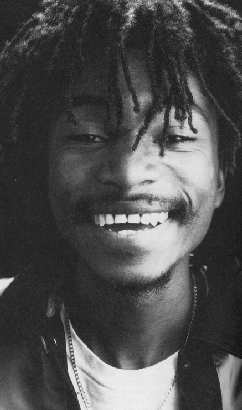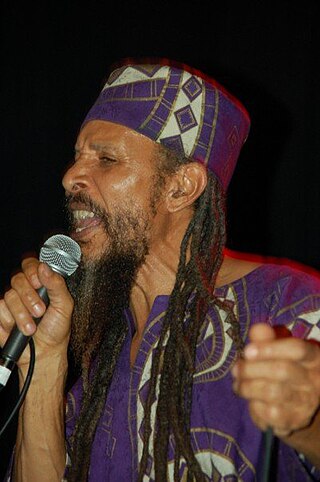
Lincoln Barrington "Sugar" Minott was a Jamaican reggae and dancehall singer, producer and sound-system operator.

Ewart Beckford OD, known by the stage name U-Roy, was a Jamaican vocalist and pioneer of toasting. U-Roy was known for a melodic style of toasting applied with a highly developed sense of timing.

Horace Andy is a Jamaican roots reggae songwriter and singer, known for his distinctive vocals and hit songs such as "Government Land", as well as "Angel", "Spying Glass", and "Five Man Army" with English trip hop group Massive Attack. He is also famous for a cover version of "Ain't No Sunshine". Andy is often described as one of the most respected and influential singers in Jamaica.

Dennis Emmanuel Brown CD was a Jamaican reggae singer. During his prolific career, which began in the late 1960s when he was aged eleven, he recorded more than 75 albums and was one of the major stars of lovers rock, a subgenre of reggae. Bob Marley cited Brown as his favourite singer, dubbing him "The Crown Prince of Reggae", and Brown would prove influential on future generations of reggae singers.

Lloyd Woodrowe James, better known as Prince Jammy or King Jammy, is a Jamaican dub mixer and record producer. He began his musical career as a dub master at King Tubby's recording studio. His dubs are known for their clear sound and use of effects.
Lester Bullock, better known by the stage name Dillinger, is a Jamaican reggae artist. He was part of the second wave of deejay toasters who rose to prominence during the mid-1970s.

Garnet Silk was a Jamaican reggae musician and Rastafarian, known for his diverse, emotive, powerful and smooth voice. During the early 1990s he was hailed as a rising talent, however his career was ended by his early death in 1994, while attempting to save his mother from her burning house.

Willi Williams is a Jamaican reggae and dub musician and producer. He is known as the "Armagideon Man" after his hit, "Armagideon Time", first recorded in 1977 at Studio One in Kingston. The song was covered by The Clash as the flipside of their "London Calling" single.

Screaming Target is the debut album by Jamaican deejay Big Youth. It was recorded and originally released in 1972 on the Gussie and Jaguar labels in Jamaica. It was issued in the United Kingdom in 1973 by Trojan Records.

The Chanting Dread Inna Fine Style is a 1983 compilation of singles tracks released by Big Youth on his Negusa Nagast label dating back as far as 1973. It followed the similarly-sourced Some Great Big Youth collection. Both albums were released by Heartbeat Records.
Carlton "Santa" Davis is a musician from Jamaica, primarily known for his drumming with bands such as Bob Marley & The Wailers, The Aggrovators, Soul Syndicate and Roots Radics. He has worked with reggae artists such as Jimmy Cliff, Black Uhuru, Burning Spear, Big Youth, The Wailers, Peter Tosh, Andrew Tosh, Wailing Souls, Ini Kamoze, Big Mountain, Michael Rose, and Ziggy Marley.

Natty Universal Dread 1973–1979 is a 3-CD-Box-set by Big Youth, released in 2001.

Vivian Neville Jackson, better known as Yabby You, was a reggae vocalist and producer, who came to prominence in the early 1970s through his uncompromising, self-produced work.
Trinitya.k.a.Junior Brammer was a Jamaican reggae deejay and producer, whose career began in the mid-1970s and continued into the 1990s.

Nkrumah "Jah" Thomas is a reggae deejay and record producer who first came to prominence in the 1970s, later setting up his own Midnight Rock and Nura labels.

Michael George Haynes, known professionally as Michael Prophet, was a Jamaican roots reggae singer known for his "crying" tenor vocal style, whose recording career began in 1977. Prophet was one of Jamaica’s most popular roots reggae singers and had several prominent hits during his 40-year career, after his passing his family together with Thomas Evers of Rockers Artist Agency released the highly rated live album "live at plein les watts"
Ranking Joea.k.a.Little Joe is a reggae deejay who rose to prominence in the 1970s and had continuing success in the 1980s.
Huford Brown, better known by the stage name U Brown, is a reggae deejay who released eleven albums between 1976 and 1984.
Neville Beckford, better known as Jah Woosh, was a Jamaican reggae deejay and record producer, primarily known for his work in the 1970s.
Everald Pickersgill, better known as David Jahson, is a Jamaican reggae singer, active since the early 1970s.














